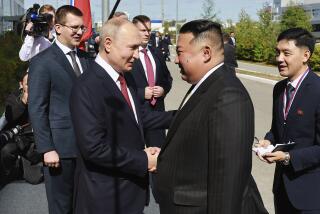1st Session Underscores Rivalry : Wide Gulf Divides North, South as Two Koreas Meet
- Share via
PANMUNJOM, Korea — Two smiling men representing the parliaments of the two hostile halves of the Korean Peninsula stood across a huge conference table Friday and tried to shake hands before a wall of flashing cameras. Their hands could not reach.
So began the first official contact between politicians from North and South Korea in nearly three years, as the five-member delegations from Pyongyang and Seoul met to start working on a scheme that might bring North Korean athletes to the Seoul Olympics and pave the way for a nonaggression agreement.
The seemingly insurmountable gulf between the two Koreas was quickly underscored in the 2-hour, 45-minute session in which both sides refused to budge from their opening positions.
The negotiations, aimed at setting up procedures for a large-scale, joint parliamentary meeting in the North Korean capital of Pyongyang at the end of the month, resumed today at this truce village in the demilitarized zone separating North and South Korea.
However, chances for success looked dim after Friday’s session ended at Tongilgak, a conference hall a few hundred yards into North Korean territory from the military demarcation line drawn in the armistice that stopped the fighting in the bloody 1950-1953 Korean War. North and South Korea remain technically at war and have been locked in a tense and bitter rivalry for decades.
Park Jun Kyu, chief of the South Korean delegation, rated the odds for convening the parliamentary meeting at 50-50. “It’s a matter of hope and prayer,” he told reporters.
Park’s counterpart from the Communist North--the one whose hand Park could not reach across the conference table--was slightly more optimistic.
“The talks will go on,” said Chon Kum Chol, chief representative of North Korea’s rubber-stamp Supreme People’s Assembly. “It’s significant that we did meet today, and this will give hope to the people.”
The delegation from South Korea’s National Assembly, which included three opposition lawmakers, arrived with the urgent task of persuading the north to abandon its Olympic boycott and agree to send competitors to Seoul before the Sept. 2 cutoff for registration for individual events. Team registration is already closed.
Demand Rejected
Seoul has rejected Pyongyang’s demand to co-host the Olympics, which begin Sept. 17, and maintains that any participation by North Korean athletes must be unconditional. As a sop, it has backed a compromise proposal by the International Olympic Committee that North and South Korean teams march side by side in the opening and closing ceremonies, carrying their respective national flags.
However, Pyongyang rejected the IOC proposal Tuesday, insisting that the plan would give the world the impression that there are two Koreas, instead of one country divided temporarily by geopolitical forces but striving for reunification.
Analysts in the South speculated before Friday’s session that the North had proposed a meeting of the two Parliaments in response to a July 9 initiative by the South’s lawmakers, with the intention of having the effort fail and thus justify its boycott of the games.
Because Friday’s discussion centered on procedures for the main parliamentary talks, rather than on the Olympics question, it is not clear whether North Korea is willing to be flexible in its demands to co-host the games and field joint teams of athletes.
Wanted Huge Delegation
The North Korean delegation stuck to its insistence that the full legislative assemblies of both countries, joined by representatives of social organizations, take part in the parliamentary talks. The agenda, the North said, should include issuing a joint declaration on nonaggression that would open the door to a solution on the Olympics.
However, the South’s delegation complained that this plan would result in an unwieldy gathering of about 1,000 conferees. Instead, it proposed that 20-member delegations from each side, made up solely of legislators, take part. The South also said that a final decision on a nonaggression declaration, in which the North wants to include a call for phased withdrawal of U.S. troops from the peninsula, should be left up to their respective governments.
IOC-sponsored negotiations on the issue of co-hosting the Olympics broke off last year when the two sides could not agree on the number of events to be held on North Korean soil.
Relations between the two governments deteriorated after that. They reached a low point after a bomb exploded aboard a South Korean airliner flying near the Thai-Burmese border, causing the deaths of all 115 people on board. A woman identifying herself as a North Korean intelligence agent later confessed to helping plant the bomb in a plot to spoil the Seoul Olympics. The threat of North Korean terrorism has cast a shadow on the games ever since.
More to Read
Sign up for Essential California
The most important California stories and recommendations in your inbox every morning.
You may occasionally receive promotional content from the Los Angeles Times.










